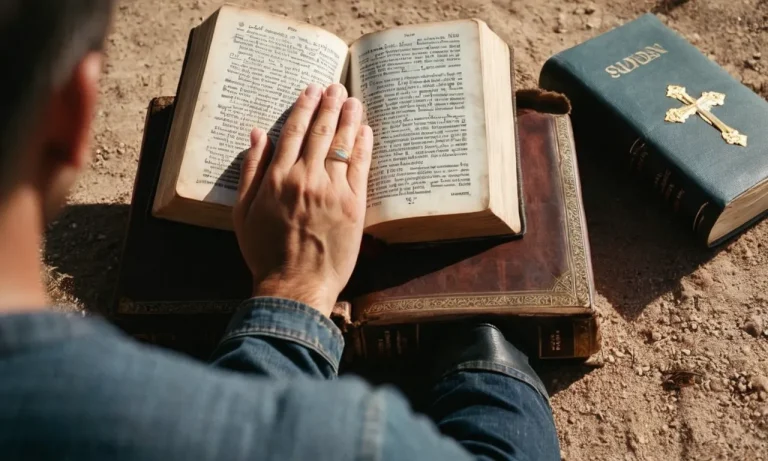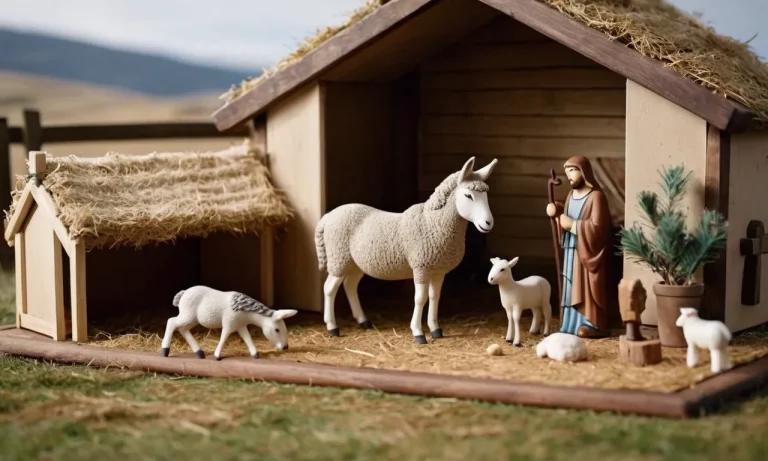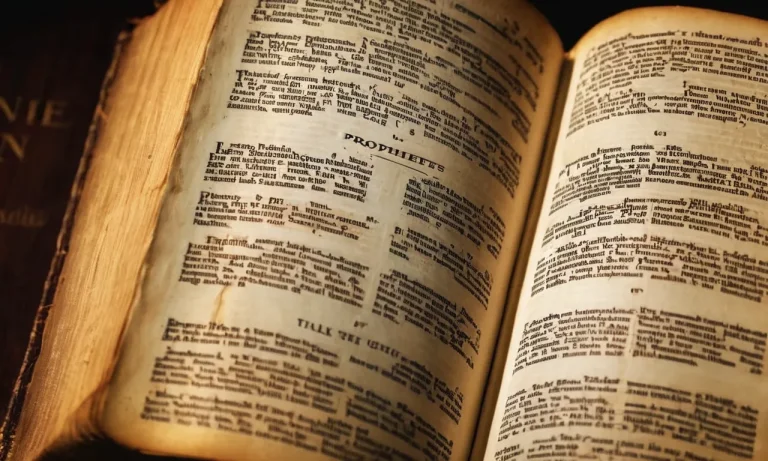What Does The Bible Say About Widows?
The Bible has a lot to say about caring for widows. Widows were among the most vulnerable groups in ancient societies, and God calls his people to look after them.
If you’re short on time, here’s a quick answer: the Bible commands us to honor and care for widows by not taking advantage of them, providing for their needs, and treating them as we would our own mothers.
In this comprehensive article, we will explore numerous Bible passages about widows, including God’s commands to the community, instructions for widows themselves, examples of widows in the Bible, and promises of God’s care for widows.
God’s Commands to the Community Regarding Widows
Do Not Take Advantage of or Mistreat Widows
The Bible contains several strong warnings against mistreating or taking advantage of widows. For example, Exodus 22:22 states, “Do not take advantage of the widow or the fatherless.” Deuteronomy 24:17 adds, “Do not deprive the foreigner or the fatherless of justice, or take the cloak of the widow as a pledge.”
These verses make it clear that God’s people should be protecting and caring for widows, not exploiting or harming them.
The prophets also sternly warned against oppressing widows. Isaiah 1:17 declares, “Learn to do right; seek justice. Defend the oppressed. Take up the cause of the fatherless; plead the case of the widow.” Zechariah 7:10 states, “Do not oppress the widow or the fatherless, the foreigner or the poor.”
Mistreating widows who were vulnerable economically and socially went directly against God’s standards of justice and compassion.
Provide for the Needs of Widows
The Bible instructs God’s people to meet the material needs of widows in their community. Deuteronomy 14:29 says, “the Levite (because he has no allotment or inheritance with you), and the foreigner, the fatherless and the widow who live in your towns may come and eat and be satisfied.”
This shows care for widows by allowing them to share in the tithes and offerings.
The early church also made sure that widows were provided for. Acts 6:1-7 describes how the apostles appointed deacons to ensure that all the widows were getting their daily distribution of food. James 1:27 declares that true “religion that God our Father accepts as pure and faultless is this: to look after orphans and widows in their distress.”
Caring for widows was a vital way the church obeyed God and practiced true religion.
Honor Widows as You Would Your Mother
Paul instructs Timothy, “Give proper recognition to those widows who are really in need” (1 Timothy 5:3). The church is called to value widows and make sure they are honored and cared for. 1 Timothy 5 provides criteria for supporting “widows indeed” who were older and did not have family to care for them.
Paul says younger widows should “marry, have children, manage their homes,” but older widows who were alone could devote themselves to prayer and service in the church (1 Timothy 5:14). They were to be viewed as dearly loved mothers: “The widow who is really in need and left all alone puts her hope in God and continues night and day to pray…If she has children or grandchildren, these should learn first of all to put their religion into practice by caring for their own family and so repaying their parents and grandparents, for this is pleasing to God” (1 Timothy 5:5, 4).
Instructions for Widows Themselves
Trust in God’s Care and Provision
Widows can be reassured that God cares for them and will provide for their needs (Psalm 68:5, James 1:27). Though grief may seem overwhelming, widows can pour out their hearts to a compassionate God who promises to be near to the brokenhearted (Psalm 34:18).
They can be comforted knowing their tears are collected and losses are not overlooked (Psalm 56:8). Widows can trust God daily by acknowledging their dependence on Him through prayer (1 Peter 5:7). As they do, He will sustain them.
Pray and Petition God
God encourages widows to actively seek Him through fervent prayer (1 Thessalonians 5:17). Coming before God honestly allows widows to find mercy and grace to help in time of need (Hebrews 4:16). Widows can make requests to their caring Father, asking Him to provide food, clothing and shelter (Matthew 6:11, Philippians 4:6).
Intercessory prayer for family members can give widows a sense of continued purpose. As they make earnest petitions to the God of justice, He hears them (Exodus 22:22-24).
Remain Devout and Avoid Idleness
Widows are encouraged to nurture their relationship with God through scripture reading, fellowship at church, acts of service and avoidance of sin (1 Timothy 5:5-6, James 1:27). Joining a grief support group can provide encouragement from women experiencing similar losses (see Griefshare.org).
Getting involved in service at church gives widows a sense of community and spiritual nourishment (Galatians 6:2). Reaching out to help meet pressing needs of others helps avoid falling into idleness and distress. In all this, widows honor God by persevering in faith (Luke 18:1-8).
Biblical Examples of Widows
The Widow of Zarephath
The story of the widow of Zarephath is found in 1 Kings 17. This poor widow was suffering greatly during a famine, with barely enough food to feed herself and her son. When the prophet Elijah found her gathering sticks to cook one final meal before dying, he asked her to share some bread with him first.
Amazingly, even in her desperate state, the widow obeyed Elijah’s request. She prepared a meal with her last bit of flour and oil, fed Elijah, and then discovered that God miraculously refilled her jars of flour and oil. This allowed the widow and her household to eat for many days afterwards.
God honored the widow’s faith and generosity in the midst of extreme poverty.
Ruth and Naomi
The book of Ruth in the Old Testament tells the story of two widowed women – Ruth and her mother-in-law Naomi. After Naomi’s husband and two sons died, she decided to return to her homeland of Bethlehem. Ruth faithfully went with Naomi rather than stay with her own people in Moab.
As a childless widow in that culture, Ruth was in an extremely vulnerable position. However, she worked diligently to provide for herself and Naomi by gathering leftover grain in the fields near Bethlehem. Through divine orchestration, Ruth eventually married an honorable, well-to-do man named Boaz.
He willingly redeemed Ruth and Naomi from their widowhood by marrying Ruth. This beautiful story illustrates God’s loving protection and provision for widows.
Anna the Prophetess
Luke 2 introduces Anna as a very old widow who served faithfully in the temple, worshiping God day and night through prayer and fasting. When the baby Jesus was brought to the temple to be dedicated, Anna recognized that this child was the long-awaited Messiah.
She rejoiced and proclaimed the news of Jesus’ arrival to all who anticipated Israel’s redemption. Though little is known about Anna’s life, it is clear she used her years as a widow to selflessly serve God and others.
She represents the spirit of perseverance, devotion and wisdom that comes through decades of walking closely with the Lord.
The Persistent Widow and the Unjust Judge
Jesus shared a parable in Luke 18:1-8 about a poor, powerless widow who repeatedly asked an unjust judge to give her justice against her adversary. Though the judge ignored her at first, eventually he granted her request just to get her to leave him alone!
Jesus used this story to illustrate the importance of persistent prayer and trusting God to answer our requests in his perfect timing. As defenseless as this widow was, she shamelessly continued bringing her needs before the judge until justice was served.
How much more will our loving Father respond to His children who cry out to Him day and night?
God’s Care and Promises for Widows
God Protects and Upholds Widows
The Bible clearly states that God cares for and protects widows in their distress. Exodus 22:22 declares, “Do not take advantage of the widow or the fatherless.” God sternly warns those who would harm or exploit widows, saying He Himself will hear their cry.
Psalm 146:9 also affirms this: “The Lord watches over the foreigner and sustains the fatherless and the widow.” God promises to sustain and uphold widows, providing for their needs.
There are many examples in Scripture of God coming to the aid of widows in miraculous ways. He heard the cry of a widow who had nothing left but a small amount of oil, miraculously multiplying it to pay off debt and sustain her family (2 Kings 4:1-7).
Jesus Himself noticed a poor widow putting two small copper coins into the temple treasury, commending her faith (Mark 12:41-44). Indeed, God sees and knows if anyone takes advantage of or harms widows.
God Hears the Prayers of Widows
God especially inclines His ear to hear the prayers of widows. Psalm 68 proclaims, “A father to the fatherless, a defender of widows, is God in his holy dwelling. God sets the lonely in families” (Psalm 68:5-6).
He cares not just for their physical needs but also their emotional and spiritual needs in their loneliness. The apostle Paul commands all believers to honor widows (1 Timothy 5:3), and James says that true religion is to care for widows in their distress (James 1:27).
There are inspiring accounts of God answering the heartfelt prayers of widows in the Bible. A desperate widow cried out to the prophet Elisha when creditors threatened to take her children. God miraculously provided oil that she could sell to pay off debt through Elisha (2 Kings 4:1-7).
Jesus noticed and affirmed the faith of the persistent widow who kept asking the unjust judge for help until he relented (Luke 18:1-8). Our Lord Jesus cares much more than any unjust judge and inclines His ear to widows.
Widows Who Trust in God Will Lack No Good Thing
God promises to provide for and bless widows who trust in Him. King David declares in Psalm 68:5, “A father to the fatherless, a defender of widows, is God in his holy dwelling.” God cares for widows in the same way a good father cares for his children, providing for their every need.
Jesus reassures us, “So do not worry, saying, ‘What shall we eat?’ or ‘What shall we drink?’ or ‘What shall we wear?’… your heavenly Father knows that you need them” (Matthew 6:31-32). Widows who look to the Lord in dependent faith lack no good thing.
The early church cared for widows like Dorcas who was “always doing good and helping the poor” (Acts 9:36). As widows trust God and care for others, He blesses them in return, promising to “make her deserts like Eden, her wastelands like the garden of the Lord” (Isaiah 51:3).
Despite loneliness and difficulties adjusting to singleness, God fills the deepest needs of widows who rely on Him. They overflow with purpose and joy as He leads them each day. Indeed, widows who hope in the Lord will renew their strength (Isaiah 40:31).
Conclusion
The Bible speaks extensively about caring for widows in ancient Israelite society. God calls his people to generously provide for widows’ needs, honor them, and treat them justly. He also promises to hear their prayers and be their protector and provider.
As God’s people today, we are called to carry on this biblical mandate to care for the widows among us. We must ensure widows are valued members of our communities of faith where their dignity and needs are provided for.








